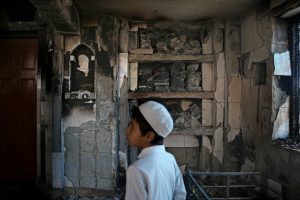“Nor must we countenance that political convenience determines responses to terrorism, extremism and violence” – these were the words spoken by India’s External Affairs Minister Subrahmanyam Jaishankar during his address to the 78th U.N. General Assembly. The address came after allegations made by the Canadian government over the involvement of the Indian government in the killing of a Canadian citizen involved in the Khalistan movement, an ethno-religious movement whose aim is to establish a Sikh nation.
The purpose of this article is not to comment on the geopolitical relations between Canada and India, but to closely examine how the Indian government classifies terrorism domestically.
While officials like Jaishankar declare on the international stage that political convenience cannot determine responses to terrorism, back home in India violent acts against minorities are increasing. The Armed Conflict Location and Event Data Project (ACLED), a disaggregated data collection, analysis, and crisis mapping project, showed that from January 2016 to October 2022, South Asia recorded almost 16,270 cases of anti-civilian violence, of which, 62.4 percent of cases happened in India. A closer look at the data shows that it is specifically violence perpetrated by Hindutva militant organizations that has consistently been on the rise.
Thus, it is imperative we understand how the Indian state defines terrorism and extremism and what the current Indian government is doing in order to keep a track of this increasing violence.
The Unlawful Activities (Prevention) Act, the law that is in effect in India to combat terrorism, defines a terrorist act as “any act with intent to threaten or likely to threaten the unity, integrity, security, [economic security,] or sovereignty of India or with intent to strike terror or likely to strike terror in the people or any section of the people in India or in any foreign country.” The means of such an act could take different forms: the use of explosive substances, causing death or injury, or the destruction of property.
Going by this definition, the Hindutva organizations that have been given free reign in India must be classified as terrorist organizations. Their lynching of suspected beef eaters and targeting of Muslim communities with violence certainly are intended to “strike terror” into non-Hindus and thus “threaten the unity” of India’s social fabric.
Yet these Hindutva organizations, which are ideologically aligned with the right-wing extremist Rashtriya Swayamsevak Sangh (RSS) Hindu nationalist movement and the ruling Bharatiya Janata Party, are beneficiaries of state patronage, which allows them to operate and spread terror across the minorities of the nation.
The list of organizations designated as terrorist organizations as per the India’s Ministry of Home Affairs does not include a single organization that aligns with the Hindutva ideology. Going by the definition of a terrorist act as per the UAPA, many of the Hindu nationalist organizations must be included in the list due to the amount of terror and damage they perpetuate.
An analysis of the National Crime Records Bureau of 2021 brings to light even more disturbing facts. Chapter 10B of the National Crime Records Bureau displays data on the crimes carried out by extremists, insurgents, and terrorists. Data on incidents of violence carried out by left-wing extremists and insurgents in India’s Northeast has been captured with much enthusiasm. When it comes to the data on terrorists, the category has been divided into “Jihadi Terrorists” and “Other Terrorists,” with the majority of incidents of violence being focused on the region of Jammu and Kashmir and a few being shown in Punjab, Kerala, Nagaland, Jharkhand, and Haryana.
The lack of data representation on violence perpetrated by Hindutva terrorist organizations displays how the government in power furthers its nation-building agenda by allowing these organizations to further the social divide in the country through the use of violence and religion. The BJP government has said on record in the Rajya Sabha that no separate data is maintained by the National Crime Records Bureau on the people killed or injured by Hindutva vigilante groups. This shows the intrinsic bias the government has toward spreaders of saffron terrorism: Far from seeing these acts as terrorism, they are not seen as crimes at all. We see representatives of the BJP endorse those responsible for acts of terrorism against minorities by garlanding them, giving the acts of violence perpetrated by them legitimacy and sending the message across to other vigilantes that this form of terrorism is desirable.
The manner in which the Unlawful Activities (Prevention) Act is used is what is most shocking and disturbing. The law has become an effective tool that is utilized by the government to crush any forms of dissent in the country. On October 4, the act was weaponized and used against Prabir Purkayastha, founder and editor-in-chief of the NewsClick media portal, and Amit Chakraborty, the human resources head.
Under the regime of the present government, we see the UAPA is being utilized to put activists, lawyers, and journalists who speak against the state behind bars. Those charged under the law are designated as terrorists without any incriminating evidence and with attaining bail being next to impossible. Official data from the Union Home Ministry in the Rajya Sabha brought to light that 97.5 percent of people arrested under the Unlawful Activities (Prevention) Act between 2016 and 2020 have been imprisoned for multiple years while waiting for trial.
Such is the present state of affairs. Laws that must be utilized to prevent acts of terrorism from taking place are used to stifle dissent. Meanwhile, the ruling government is endorsing the terror that is unleashed by Hindutva organizations and refusing to take action or even maintain data on the incidents of violence. This leaves the responsibility of upholding the truth to fall on brave citizens and journalists who still brave the might of the state to stand for truth and democracy, the ideal on which this nation was built.

































